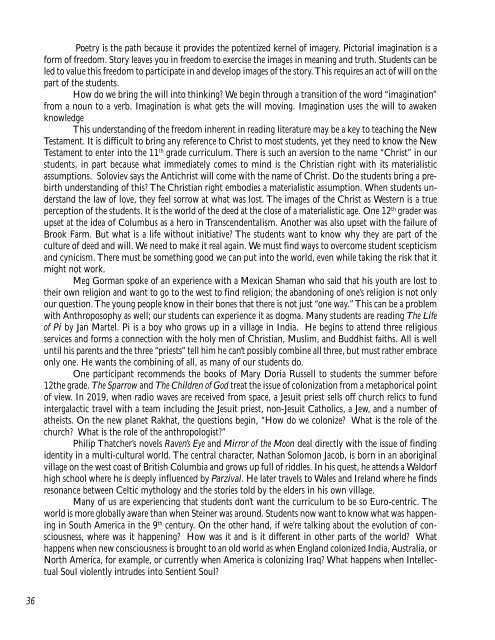Colloquium on English - Research Institute for Waldorf Education
Colloquium on English - Research Institute for Waldorf Education
Colloquium on English - Research Institute for Waldorf Education
You also want an ePaper? Increase the reach of your titles
YUMPU automatically turns print PDFs into web optimized ePapers that Google loves.
36<br />
Poetry is the path because it provides the potentized kernel of imagery. Pictorial imaginati<strong>on</strong> is a<br />
<strong>for</strong>m of freedom. Story leaves you in freedom to exercise the images in meaning and truth. Students can be<br />
led to value this freedom to participate in and develop images of the story. This requires an act of will <strong>on</strong> the<br />
part of the students.<br />
How do we bring the will into thinking? We begin through a transiti<strong>on</strong> of the word “imaginati<strong>on</strong>”<br />
from a noun to a verb. Imaginati<strong>on</strong> is what gets the will moving. Imaginati<strong>on</strong> uses the will to awaken<br />
knowledge<br />
This understanding of the freedom inherent in reading literature may be a key to teaching the New<br />
Testament. It is difficult to bring any reference to Christ to most students, yet they need to know the New<br />
Testament to enter into the 11 th grade curriculum. There is such an aversi<strong>on</strong> to the name “Christ” in our<br />
students, in part because what immediately comes to mind is the Christian right with its materialistic<br />
assumpti<strong>on</strong>s. Soloviev says the Antichrist will come with the name of Christ. Do the students bring a prebirth<br />
understanding of this? The Christian right embodies a materialistic assumpti<strong>on</strong>. When students understand<br />
the law of love, they feel sorrow at what was lost. The images of the Christ as Western is a true<br />
percepti<strong>on</strong> of the students. It is the world of the deed at the close of a materialistic age. One 12 th grader was<br />
upset at the idea of Columbus as a hero in Transcendentalism. Another was also upset with the failure of<br />
Brook Farm. But what is a life without initiative? The students want to know why they are part of the<br />
culture of deed and will. We need to make it real again. We must find ways to overcome student scepticism<br />
and cynicism. There must be something good we can put into the world, even while taking the risk that it<br />
might not work.<br />
Meg Gorman spoke of an experience with a Mexican Shaman who said that his youth are lost to<br />
their own religi<strong>on</strong> and want to go to the west to find religi<strong>on</strong>; the aband<strong>on</strong>ing of <strong>on</strong>e’s religi<strong>on</strong> is not <strong>on</strong>ly<br />
our questi<strong>on</strong>. The young people know in their b<strong>on</strong>es that there is not just “<strong>on</strong>e way.” This can be a problem<br />
with Anthroposophy as well; our students can experience it as dogma. Many students are reading The Life<br />
of Pi by Jan Martel. Pi is a boy who grows up in a village in India. He begins to attend three religious<br />
services and <strong>for</strong>ms a c<strong>on</strong>necti<strong>on</strong> with the holy men of Christian, Muslim, and Buddhist faiths. All is well<br />
until his parents and the three “priests” tell him he can’t possibly combine all three, but must rather embrace<br />
<strong>on</strong>ly <strong>on</strong>e. He wants the combining of all, as many of our students do.<br />
One participant recommends the books of Mary Doria Russell to students the summer be<strong>for</strong>e<br />
12the grade. The Sparrow and The Children of God treat the issue of col<strong>on</strong>izati<strong>on</strong> from a metaphorical point<br />
of view. In 2019, when radio waves are received from space, a Jesuit priest sells off church relics to fund<br />
intergalactic travel with a team including the Jesuit priest, n<strong>on</strong>-Jesuit Catholics, a Jew, and a number of<br />
atheists. On the new planet Rakhat, the questi<strong>on</strong>s begin, “How do we col<strong>on</strong>ize? What is the role of the<br />
church? What is the role of the anthropologist?”<br />
Philip Thatcher’s novels Raven’s Eye and Mirror of the Mo<strong>on</strong> deal directly with the issue of finding<br />
identity in a multi-cultural world. The central character, Nathan Solom<strong>on</strong> Jacob, is born in an aboriginal<br />
village <strong>on</strong> the west coast of British Columbia and grows up full of riddles. In his quest, he attends a <strong>Waldorf</strong><br />
high school where he is deeply influenced by Parzival. He later travels to Wales and Ireland where he finds<br />
res<strong>on</strong>ance between Celtic mythology and the stories told by the elders in his own village.<br />
Many of us are experiencing that students d<strong>on</strong>’t want the curriculum to be so Euro-centric. The<br />
world is more globally aware than when Steiner was around. Students now want to know what was happening<br />
in South America in the 9 th century. On the other hand, if we’re talking about the evoluti<strong>on</strong> of c<strong>on</strong>sciousness,<br />
where was it happening? How was it and is it different in other parts of the world? What<br />
happens when new c<strong>on</strong>sciousness is brought to an old world as when England col<strong>on</strong>ized India, Australia, or<br />
North America, <strong>for</strong> example, or currently when America is col<strong>on</strong>izing Iraq? What happens when Intellectual<br />
Soul violently intrudes into Sentient Soul?

















